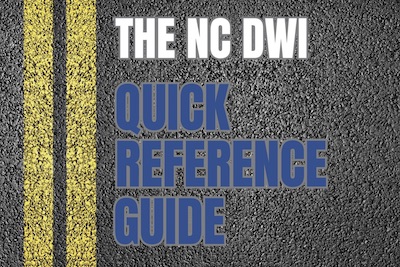Most people charged with DWI in North Carolina are subject to some sort of license revocation or administrative suspension, if only for a temporary period of time.
If you’re accused of DUI in Charlotte, which does not always require an arrest and being taken to the Mecklenburg County Jail, there may be legal options available to set aside the revocation, obtain a limited privilege, or other form of administrative relief.
"Drunk driving” charges have the potential to result in a suspended license, which clearly does not happen in every instance. The criminal laws requiring such a revocation of license may be more expansive and consequential than you realize.
N.C.G.S. § 20-16.5 authorizes and otherwise directs the NC Department of Transportation / Division of Motor Vehicles or “DMV” to enforce a civil revocation for implied consent offenses, which includes Driving While Impaired, in addition to other criminal charges.
Put simply, getting your license revoked is not strictly limited to just DWI charges. There are other serious criminal offenses in North Carolina that fall under the definition of an Implied Consent Offense.
Probable Cause in DWI ChargesThe implied consent laws in North Carolina mandate probable cause exist to charge someone with DWI, which is normally a condition precedent to request breath testing, blood sample, or urine. **
The “implied consent” is a quasi-contract theory, where it is “implied” that you consent to testing in certain legal circumstances.
Willful refusal to submit to such testing, while not technically a separate criminal charge, demands careful consideration by DWI lawyers.
** Urine testing is authorized under the General Statutes, although as of the latter part of 2018, Bill Powers, author of the NC DWI Quick Reference Guide, is unaware of a single case in North Carolina that has ever been prosecuted using urine as a testing protocol. If you have information regarding urine testing, please contact Bill Powers directly at: Bill@342HELP.com
If consistent with N.C.G.S. 20-16.2 (the NC Implied Consent Law), police must possess “reasonable grounds” to believe the person charged committed a criminal offense, specifically an “implied consent offense.”
It frankly can be a bit complicated, in that it is easy to confuse Reasonable Suspicion with Reasonable Grounds.
Reasonable Suspicion is a lower standard of proof, only requiring something more than a mere hunch or speculation. Reasonable Grounds requires substantially more evidence and therefore demands a higher standard of proof.
Standards of Proof in North Carolina
Our appellate courts have made it clear Reasonable Grounds are synonymous with Probable Cause.
Judges in North Carolina understand the legal distinction, and burdens of proof, related to Reasonable Suspicion and Probable Cause (Reasonable Grounds).
Hearing Officers at DMV, who serve as both prosecutor and judge for DMV Hearings, are not required to be attorneys or judges, and understandably may have a different perspective on the nuances of the criminal laws.
Challenging a License Revocation After DWI Charges in Charlotte NC ![License Revocation after DWI Charges]()
There may be a legal basis to challenge a License Revocation for DWI. Each case, like person accused of impaired driving, is different.
As such, a careful examination of the record and supporting documentation prepared by the charging officer and licensed chemical analyst or “LCA” may be helpful to your defense.
There is a Limited Amout of Time to Challenge a “Civil Revocation” in North CarolinaAs DWI defense lawyers in Charlotte, we like to review the Alcohol Influence Report and the supporting materials inside the CVR “shuck” as maintained by the Clerk of Court’s office in Mecklenburg County.
Defense attorneys, prosecutors, and judges often refer to the court file in District Court as a “shuck.” Indeed, that term is used regularly within the criminal justice system in all of North Carolina.
“I’ve traveled near and far throughout North Carolina handing DWI charges and have yet to find a jurisdiction where the legal professionals didn’t call the file a ‘shuck,’ and thus far, I’ve also yet to hear a logical reason for how that all started.” Bill Powers, Charlotte DWI Lawyer
Sample Request for Hearing to Content License Revocation
Challenging a DWI suspension in North Carolina, and the process for doing so, is relatively complicated. And while you can always proceed pro se or “for himself” in court, it often helps to seek legal representation by an experienced criminal defense attorney.
Just because you can represent yourself in court doesn’t mean you should.
A solid defense strategy begins early-on in the investigation of the criminal charges. As stated, there are extremely important timing limitations in attempting to challenge a DWI suspension.
Those deadlines are in addition to the legal hurdles associated with challenging the legality of a license suspension due to DWI.
Put simply, while our law office provides the form to Request a Hearing, it is imperative people facing DWI charges understand this area of law can be extraordinarily complicated.
You may reach Bill Powers by email at: Bill@342HELP.com or CALL NOW: 704-342-4357
Helpful Information About Criminal Charges 
 Powers Law Firm PA Home
Powers Law Firm PA Home




















